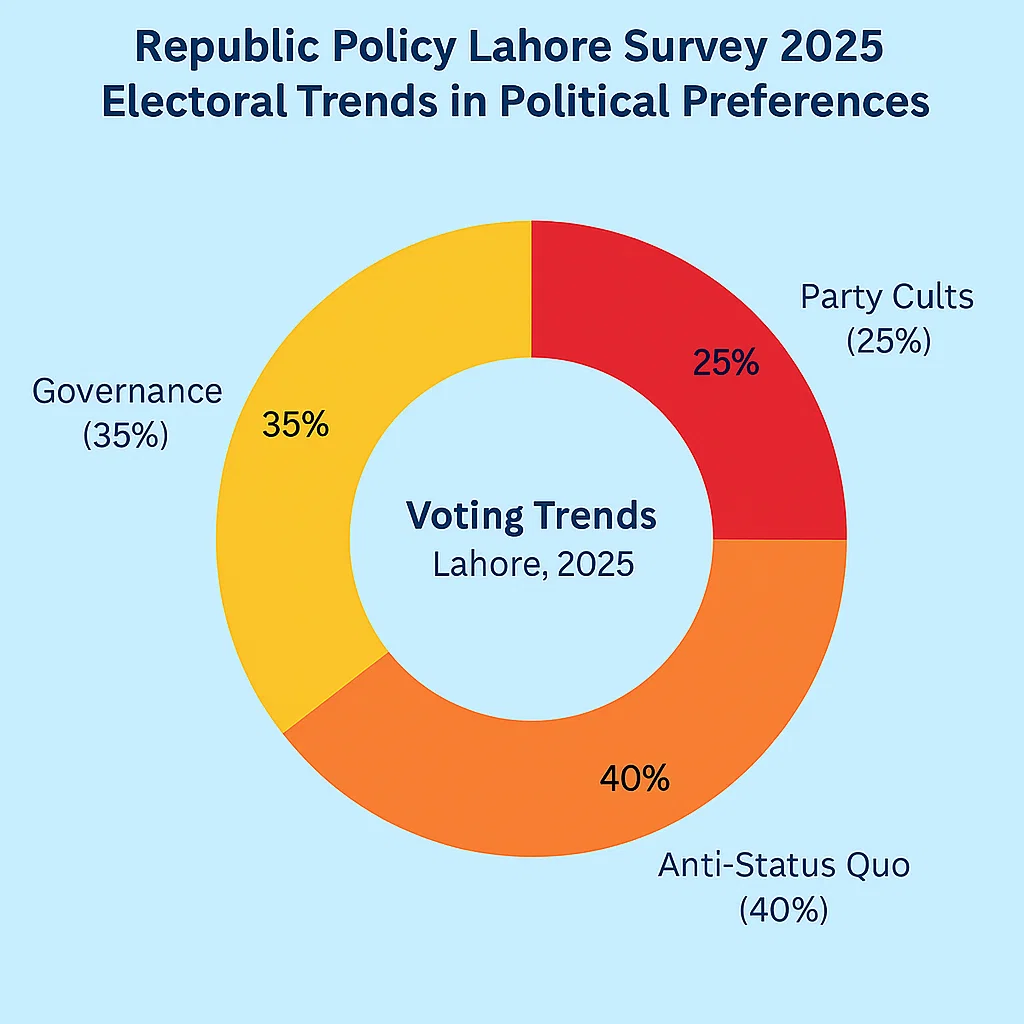Team Republic Policy
The Republic Policy Survey conducted in Lahore during July 2025 has brought forward one of the most insightful and transformative analyses of urban electoral behavior in Pakistan’s contemporary political history. For years, political analysts have debated whether Pakistani urban centers, particularly Lahore, vote based on service delivery, ideological shifts, or deeply rooted political affiliations. This latest survey, covering all 274 union councils of Lahore with a representative sample of diverse demographics, confirms that Lahore’s electorate has now crystallized into three distinct and dominant political preferences: Governance-Oriented Voters, Anti-Status Quo Electorate, and Party Cult Loyalists.
Follow Republic Policy Website
The first and perhaps the most traditional segment, Governance-Oriented Voters, constitutes 35 percent of Lahore’s total electorate. These voters evaluate political parties and candidates primarily on governance indicators such as employment creation, inflation control, infrastructural development, public service delivery, and institutional growth. They are not swayed by mere rhetoric or party symbolism; instead, they seek tangible outcomes and accountability. In Lahore’s urban environment—where exposure to policy debates, local government functioning, and civic engagement is high—this governance-based voting pattern reflects a demand for a results-oriented political culture. These voters act as Pakistan’s urban conscience, preferring competence over charisma, and administrative delivery over dynastic politics. The presence of such a sizable governance-driven bloc indicates that performance legitimacy is gaining relevance in Pakistan’s electoral dynamics.
Follow Republic Policy YouTube
However, the largest and most defining voting trend in Lahore is the Anti-Status Quo Electorate, making up 40 percent of the total voting population. This bloc represents a clear rejection of entrenched political manipulation and systemic interference by powerful institutions. For decades, Pakistan’s political history has been shaped by the visible and invisible roles of the military, bureaucracy, and judiciary in determining political outcomes. This group of voters resents that intrusion and seeks to safeguard the sanctity of the people’s vote, constitutional supremacy, and democratic continuity. Their dissatisfaction is not limited to a particular party; it is a broader disillusionment with the structure that subverts popular will. They want a Pakistan where political power flows directly from the ballot box and where the rule of law, fundamental rights, and constitutional liberties are not seasonal privileges but permanent guarantees. In Lahore, this sentiment translates into a preference for candidates and parties that explicitly reject unconstitutional interventions and promote civilian supremacy. This groundswell of anti-status quo sentiment could become the decisive force in Pakistan’s electoral politics, potentially redefining alliances, party structures, and governance models.
Follow Republic Policy Twitter
The third and perhaps most intriguing segment is Party Cult Loyalists, accounting for 25 percent of Lahore’s electorate. This bloc is driven by strong emotional and social affiliations rather than governance performance or ideological opposition to the status quo. Party cults are built on personalities, political legacies, community associations, and identity markers such as biradari (kinship), religion, caste, clan, or regional solidarity. In Pakistan’s political sociology, such loyalty often transcends logical policy debates—voters from this category stick to their political choice irrespective of performance or failures, often treating political allegiance as a matter of honor, heritage, or faith. This deep-rooted loyalty can be both an asset and a liability: while it ensures stable vote banks for parties, it also discourages accountability and reduces the pressure on parties to reform. In Lahore’s political theatre, party cults manifest in passionate rallies, unwavering defence of leaders, and highly mobilized networks during elections.
Follow Republic Policy Facebook
What makes the Republic Policy Survey 2025 especially valuable is its demonstration that Lahore’s electorate is no longer monolithic or purely driven by patronage politics. Instead, it reveals a complex political marketplace where performance legitimacy, systemic reform demands, and emotional loyalty coexist. The Governance Voters are the rationalists—evaluating manifestos, development metrics, and administrative efficiency. The Anti-Status Quo Voters are the reformists—rejecting old power games and advocating for genuine democratic transformation. The Party Cult Loyalists are the traditionalists—rooted in cultural, communal, and historic identities.
This segmentation also hints at future political contests in Lahore and Pakistan at large. Political parties aiming to dominate the Lahore constituency must recognize that no single narrative will sway all voters. For governance-oriented voters, manifestos must contain concrete, measurable promises with credible timelines. For anti-status quo voters, clear commitments to civilian supremacy, constitutional enforcement, and judicial independence must be front and center. For party cult loyalists, emotional connection, symbolic representation, and community outreach will remain the primary currency. Winning Lahore in 2025 and beyond will require a multipronged strategy that addresses these distinct yet overlapping political identities.
Moreover, the anti-status quo bloc’s dominance at 40 percent signals a potentially disruptive shift in Pakistan’s politics. If mobilized effectively, this group could challenge decades of entrenched political engineering and usher in an era of voter-centric democracy. However, fragmentation within this bloc—due to differences in party choice or lack of unified leadership—could dilute its impact. This makes coalition-building, political messaging, and grassroots organization critically important for any party seeking to channel this discontent into electoral victory.
Follow Republic Policy Website
In historical perspective, Lahore has often served as a political trendsetter for Punjab and, by extension, Pakistan. From the Pakistan Movement in the 1940s to the waves of populist politics in the 1970s, Lahore’s streets, unions, and neighborhoods have echoed with political movements that later swept the country. The 2025 survey suggests that Lahore is once again poised to influence national politics—this time by redefining the metrics of electoral success. Parties can no longer rely solely on traditional vote banks or symbolic gestures; they must engage with an electorate that is both politically aware and assertively demanding.
Republic Policy Survey offers a clear roadmap for political stakeholders: respect governance metrics, embrace democratic reforms, and understand the socio-cultural pull of party cults. Ignoring any one of these three will come at the cost of electoral relevance. In the final analysis, Lahore’s political identity in 2025 is not just a local story—it is a reflection of Pakistan’s broader struggle between tradition and transformation, between engineered politics and people’s sovereignty.
















